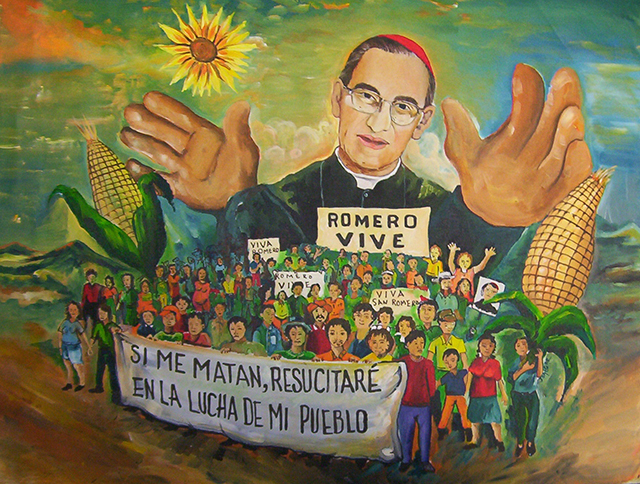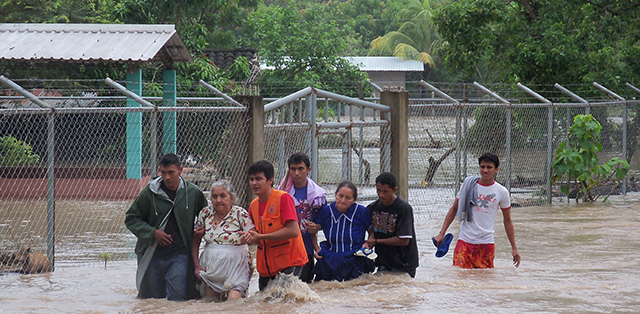
Much of the news coming out of El Salvador these days highlights the violence and suffering plaguing the small Central American nation of 6.34 million people. The country has seen a worrying amount of violence of late, with 3,830 murders since the new year, earning it the dubious distinction of having one of the world’s highest homicide rates. Along with many other countries in the region, El Salvador also faces widespread poverty, wealth disparities, narco-traffic and ecological degradation. Insecurity and violence have reached levels not seen since the end of the civil war in 1992. Simultaneously, Salvadoran farmers are losing their crops to severe drought caused by a particularly strong El Niño. Only in the last couple of weeks have they seen some rain and relief.
But while many fret over escalating violence, and others in Washington pay lip service to Central America’s dire social situation, local communities are doing something to address the root causes of poverty and violence, from the lack of educational and economic opportunities to environmental degradation. Indeed, local actors are taking the reins and are tackling climate change as they live it. There is a growing grassroots movement that is working toward finding solutions to the problem of rural development and environmental conservation and promoting democracy and youth leadership.
Communities in the global South have already organized movements and implemented practices to save their environment and confront the impact of climate change. One such movement, headed by a network of communities in coastal El Salvador, shows what can be done. Nestled between the mangroves and farmland of the Lower Lempa River Basin, the Mangrove Association was formed by peasant farmers who fled the repression of the Salvadoran government during the brutal, 12-year civil war that spanned the 1980s and tore apart Salvadoran society (See Hancock, 2007). The refugees returned to the country at the end of El Salvador’s conflict to rebuild their lives on land granted to the displaced in the 1992 Peace Accords. They named the heart of their new territory “Ciudad Romero” and have sought to create an egalitarian civil society where local democracy and environmental stewardship are key principles.
Local actors are taking the reins and are tackling climate change as they live it.
Since its formation, the Mangrove Association has grown to include more than 100 communities and over 20,000 members. It is governed locally by representatives selected by community councils, who then elect a board that promotes the goals of environmental protection, sustainable development and fair representation for all who participate. Today, this movement has produced national legislators and government leaders who carry the message that immense, non-local problems like climate change have local solutions too.
From its beginning, the Mangrove Association has been concerned with the effects of droughts, flooding and damaging storms. Its territory consists of land at the delta of the Lempa River and the Bay of Jiquilisco, which contains Central America’s largest mangrove forest. Communities originally came together in the mid-1990s to protest the sudden and unannounced release of water from a government-run hydroelectric dam system that flooded their lands every rainy season.
 Community emergency response crews evacuate residents following severe flooding in 2011. (Photo: Mangrove Association Archive)
Community emergency response crews evacuate residents following severe flooding in 2011. (Photo: Mangrove Association Archive)
The Mangrove Association set up a community radio network to alert nearby communities when flooding was imminent. After a tropical storm in 2011, while nearby communities suffered numerous casualties, the youth-led emergency response network prevented any loss of life in the Mangrove Association area. The communities of the Lower Lempa engaged in organizing together and eventually received cooperation from the Salvadoran government concerning notice and timing of the release of water. Government officials and local leaders went on to work together to rebuild the levees to better protect the communities from future floods.
Immense, non-local problems like climate change have local solutions too.
For one, national farming cooperatives are producing high-quality corn seed that out-competes that of agricultural giants like Monsanto. These corn seed varieties, developed in El Salvador, have proven resistant to the country’s harsh climate and drought-prone summers. In 2014, the country had record yields of corn despite prolonged drought. A government aid program, which distributed domestically produced seed to over 400,000 subsistence farmers that year, largely facilitated the country’s record production. As drought-resistant varieties adapt to the tropical climate, these hearty seeds are suitable for mitigating the food-related impacts of climate change and the extreme weather events communities throughout El Salvador are already having to face.
The Mangrove Association’s other accomplishments include:
• Building a network of municipalities to introduce and teach the most effective methods of protecting the natural resources found in Central America’s largest mangrove forest;
• Organizing a system of local beach and boat patrols, which has, among its other achievements, helped the communities on the Bay of Jiquilisco convert from unsustainable blast fishing to sustainable line-fishing practices. Local communities have built an aquaculture economy that markets sustainably caught local seafood and have also learned to protect endangered sea turtle species by gathering and incubating eggs in local hatcheries for release, diverting them from underground market consumption;
• Diversifying local agriculture from pesticide-intensive mono crops to organically grown fruits and vegetables, while advocating for a landmark national ban on 53 dangerous agrochemicals in a country where chronic kidney disease (CKD) is an epidemic;
• Playing a key role in organizing corn-growing co-ops to bid for and obtain government contracts for local seeds as an alternative to genetically modified seed from Monsanto-backed competitors, who used to dominate seed supply;
• Introducing a law to the Salvadoran Legislature making clean drinking water a human right and implementing policies and initiatives throughout El Salvador to deliver potable water to thousands in rural areas;
• Creating a local egalitarian civil society, which is becoming a model for providing community solutions to environmental and egalitarian issues, including the empowerment of women in communities that are part of the Mangrove Association to take leadership in the local councils; (Proudly, Estela Hernandez, the former executive director of the Mangrove Association, is now a popular Salvadoran legislator advocating for environmental protection versus unchecked development.)
• Promoting youth leadership and developing projects for youth entrepreneurship and employment, including a youth-operated radio alert system, which mobilizes area communities hit hard by hurricanes and floods;
• Developing public sector and civil society partnerships to confront vulnerabilities exacerbated by climate change. Local coastal populations, which have already suffered intense drought and flooding, are living the reality of higher-than-average temperatures, more frequent and intense storm events and longer dry periods or drought.
Communities developed their own network of emergency response to make their communities more resilient to climate change. Thanks to those concrete plans and actions, the government of El Salvador completed an innovative public policy process that will integrate climate response across the majority of its public agencies. Today, El Salvador has reduced its vulnerability rating – thanks in great part to the heavy lifting done by civil society in coordination with the public sector. There is much work to be done, but also much to be learned from El Salvador’s continued struggle.
We owe a debt to the communities already experiencing climate change without having contributed to the global warming that is causing it. A good way to recognize that debt is to support communities that are suffering from extreme weather and flooding resulting from climate change and finding ways of building a resilient, sustainable society in the face of these challenges. The Mangrove Association is an example of a local organization that is applying its principles in its everyday work.
Note: Parts of this article were adapted from an article that appeared previously on EcoViva. EcoViva staff also contributed to this piece.
Join us in defending the truth before it’s too late
The future of independent journalism is uncertain, and the consequences of losing it are too grave to ignore. To ensure Truthout remains safe, strong, and free, we need to raise $27,000 in the next 24 hours. Every dollar raised goes directly toward the costs of producing news you can trust.
Please give what you can — because by supporting us with a tax-deductible donation, you’re not just preserving a source of news, you’re helping to safeguard what’s left of our democracy.